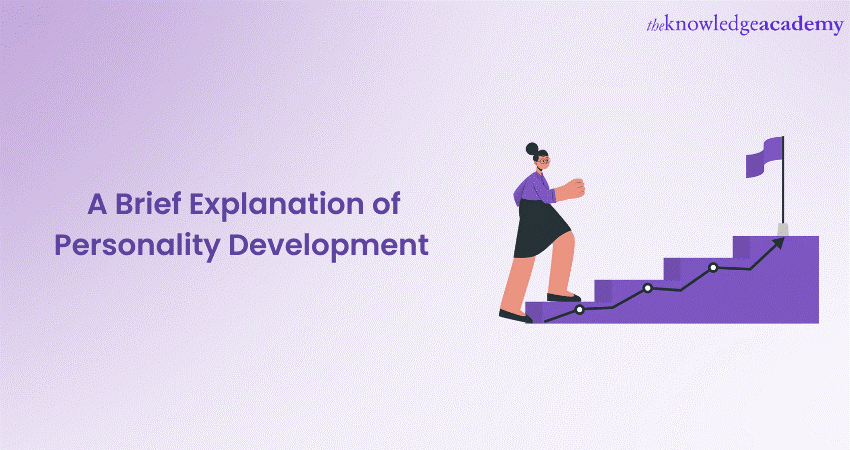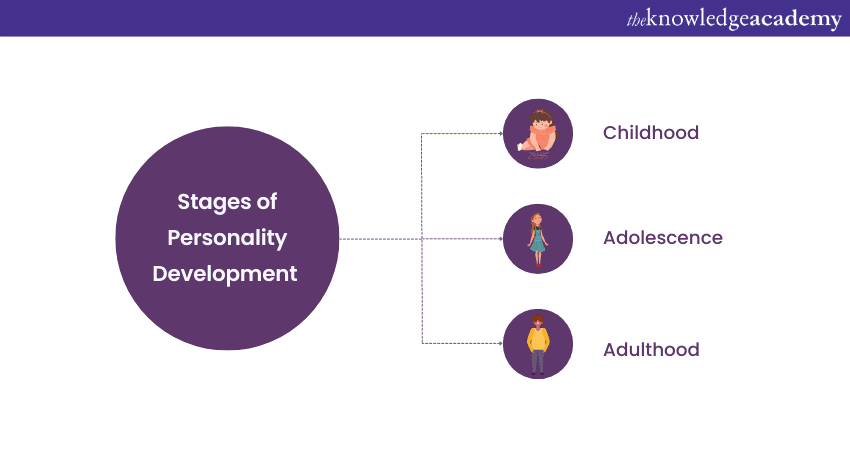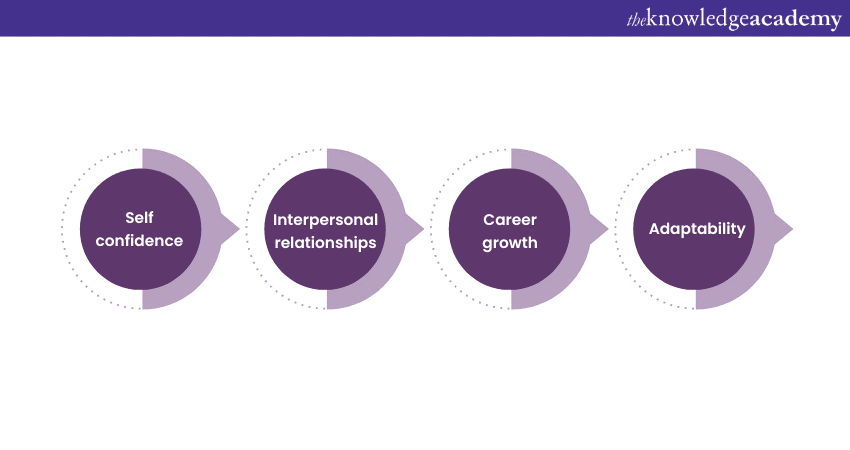We may not have the course you’re looking for. If you enquire or give us a call on +852 2592 5349 and speak to our training experts, we may still be able to help with your training requirements.
We ensure quality, budget-alignment, and timely delivery by our expert instructors.

Personality Development is the process of developing one’s character over a period of time. Even though this happens naturally in most cases, some traits can be modified. External factors have a vital role in shaping our personality. When we meet a new person, it is mostly their personality that grabs our attention.
A person's personality shapes their thoughts, beliefs & expectations. This blog will help you answer, “What is Personality Development?” and will help you discover the aspects that influence one's personality.
Table of Contents
1) What is Personality Development?
2) Factors Influencing Personality Development
3) Stages of Personality Development
4) Importance of Personality Development
5) Theories of Personality Development
6) Conclusion
What is Personality Development?
Personality Development is like a journey where we learn about ourselves and how we act. It's about getting better and changing in different ways. Imagine it as a puzzle where some parts are inherited from our families, like how we look, and some of our behaviours. But as we grow up, the things we do and the people we meet add more pieces to this puzzle, making it unique.
Our personality starts with things we get from our family, like being quiet or friendly. But as we meet more people and go through different experiences, we change and grow. For example, if we face a problem and learn how to solve it, we might Become More Confident. This is how our personality develops over time, like a story with different chapters.
Remember, everyone's personality journey is different. Just like no two puzzles are the same, each of us has our own special way of growing and becoming who we are. And as we continue this journey, it is important to adapt to challenges and discoveries that make us the wonderful individuals we are.
Factors Influencing Personality Development
Personality is a unique trait one possesses. It is also important to understand that various factors influence Personality Development. They’re listed below:
Genetics
Our genes, which we inherit from our parents, lay the foundation for our personality. Just like how you might get your hair colour from your mother or your father's smile, parts of how you act and feel also come from genes. These genes can affect whether we're naturally calm or a bit more excited, what we like, and how we handle things.
Environment
The places where we grow up and the people around us are like the artists who help paint our personalities. Our families, the places we live in, and the things we see and hear all make a big difference. If you're from a big family that loves to chat, you might also enjoy talking and sharing. Or if you’ve grown up where music is a constant presence, chances are that you might develop a love for music too.
Social Interactions
Friends, and people we spend time with can change how we are. For example, when you learn a new game from a friend who has been kind to you. You can also learn new things about how to act and behave. Talking to different people helps us see the world in new ways, which might make us try new things or even change some things about the way we act.
Life Experiences
Life is full of ups and downs, like when we win a game, or when we have a tough day. These experiences shape how we deal with things. When we handle problems, they make us stronger, and help us understand ourselves better. So, even though tough times are not fun, they help us grow and become more confident.
Education and Learning
Going to school and learning new things helps us become better people. Imagine school as a treasure of unlimited knowledge. As we learn, we Improve Communication Skills and learn how to have meaningful conversations with others, solve problems, and think about things in different ways. Education makes us more confident and helps us share our thoughts and ideas.
Media and Technology
Things such as the TV shows we watch and the media we see online can also affect how we think and feel. Just like a friend who shapes your view on the new game with their review, the things we see in media can shape our interests and the way we look at the world. So, if you like superheroes because you saw them on TV, that's the media affecting your personality.
Ignite your motivation and achieve your goals with our specialised training. Register now for our Motivation and Goal Setting Training!
Stages of Personality Development

There are three stages of personality development, which we will discuss below.
Childhood
Childhood is like the beginning of a story, where our personality starts to take shape. When we're small, the people who look after us, like our parents or guardians, are the ones who guide us on this journey. They help us feel safe when we're scared and show us love when we need it. Just like a warm blanket on a cold day, their care wraps around us and makes us feel special.
We watch our parents and other grown-ups and learn how to do things by copying them. It's a bit like learning a new game by watching someone else play first. We pick up how to talk, how to behave, and how to make sense of the world. All these little experiences come together to create our personality.
Adolescence
As we get older and become teenagers, we start to figure out who we really are. This is like exploring many things at once. Friends and other people our age have become important. We start to care about what they think and what's "cool." Sometimes, we might even change the way we dress or talk just to fit in.
We start to discover our own unique interests and values. We begin to realise that it's okay to stand out and be different. Friends and trends guide us in this period. Ultimately, we emerge with a better understanding of who we are, our strengths, and the special qualities that make us unique.
Adulthood
When we grow up and become adults, our personalities continue to grow and change. Just like how a tree keeps growing and getting stronger, we keep learning and becoming wiser. Adulthood shapes who we shall be for the rest of our lives.
Our jobs become an important part of this journey. Imagine a job you really love—it's like a special tool that helps you grow even more. It can boost your confidence and skills, making you feel capable and accomplished. The people we meet along the way, whether colleagues or friends, also contribute to our growth.
Importance of Personality Development

Personality Development is an important trait, and it shapes the person you are. Here, we’ll discuss the importance of Personality Development in your life.
Self Confidence
It is the belief in oneself, the assurance that we possess, the skills, knowledge, and qualities to overcome life's challenges. As we develop self-confidence, our personality transforms and enables us to express our thoughts. It helps us to interact confidently with others and pursue our aspirations with determination.
When we understand ourselves better, we feel surer of who we are. This confidence helps us speak our minds, have meaningful conversations, and pursue our dreams with determination. It's like having a torch that guides us in the dark.
Master organisational skills for enhanced efficiency and success. Join our Organisational Skills course today!
Interpersonal Relationships
Interpersonal relationships are a must have for meaningful connections. The Effective Personality Development tips provides us with this skill, enhancing our ability to relate to others. When we develop the skill of understanding different viewpoints, it makes things a lot easier. It's like having versatility that allows us to build bridges based on understanding.
Active listening cultivates a space where people feel valued and understood. When these skills are honed through effective Personality Development, particularly through Personal Development Activities, they form the very essence of strong interpersonal relationships. They develop trust, understanding, and connection. It makes relationships that are not only enduring but also deeply fulfilling.
Career Growth
Career growth is directly connected with the development of a robust personality. A strong personality becomes a factor in taking individuals towards success in their professional careers. Effective communication, as shaped by a strong personality, emerges as a key factor to Advance Your Career Development.
The ability to convey thoughts clearly, both in verbal and written forms, establishes a seamless space for ideas to flow. A strong personality also generates leadership qualities. It helps individuals make informed decisions and inspire their peers. This leadership quality not only benefits personal growth but also contributes to one's professional circle.
Adaptability
When we develop our personality, we cultivate the skill of adaptability. It's like learning how to dance gracefully, adjusting our steps as the music changes. This skill allows us to face changes and challenges without feeling overwhelmed. We become more open to new ideas, different ways of doing things, and even unexpected turns in our path.
Having adaptability means we don't get stuck in one way of thinking or doing things. We can think on our feet and find solutions when things don't go as planned. We can even turn setbacks into opportunities. It is a quality that helps us survive in this ever-evolving space.
Theories of Personality Development
Various theories revolve around Personality Development. Here are the three most famous theories.
Trait Theory
At the heart of the study of personality lies the Trait theory. It is a concept introduced by esteemed psychologists such as Gordon Allport and Hans Eysenck. This theory says that by identifying and classifying distinct traits or characteristics, we can gain an understanding of an individual's personality.
Strengthen your professional network and excel in business relationship building. Join our Building Business Relationships course now!
These traits are enduring qualities that paint a picture of an individual's usual patterns of thinking, feeling, and behaving. The practical applications of the Trait theory are numerous and can profoundly impact various aspects of our lives. Here’s a list of benefits:
Cultivating Self-awareness:
Self-Improvement Techniques with truly help understanding ourselves. By identifying and grasping our main qualities, we begin to learn about ourselves. With this understanding, we can make smarter choices in our everyday life and work. This improved self-awareness gives us clues about what we're good at and where we can get better.
Effective Communication:
In a world buzzing with interactions, understanding the traits of others becomes important. When we grasp the unique characteristics that shape someone's personality, we can adapt our communication style to resonate better with them. Curating our words and expressions based on their traits paves the way for clearer understanding.
Enhancing Team Dynamics:
Teamwork hinges on collaboration and togetherness, both of which are greatly influenced by individual traits. By comprehending the traits of our team members, we unlock the potential for improved dynamics. Diverse traits can be utilised to create an environment where different strengths complement each other. This leads to more effective problem-solving, innovation, and shared success.
Strengthen your professional network and excel in business relationship building. Join our Building Business Relationships course now!
Psychoanalytic Theory
Sigmund Freud's Psychoanalytic theory presents a fascinating view of Personality Development. According to this theory, our personality is a complex interplay between conscious and unconscious thoughts. Freud identified three fundamental components of personality – Innate Desires (ID), Ego, and Superego. Each plays a role in shaping our behaviour. This theory holds practical implications that can significantly enhance our daily lives:
a) Understanding Ourselves Better:
Dedicating moments to self-reflection, whether through expressive journaling or open conversations in therapy allows us to unplug hidden conflicts and emotions that might have considerable influence over our actions. By shining a light on these hidden aspects of our psyche, we gain a deeper comprehension of why we act the way we do.
Enhance your Emotional Intelligence for a more fulfilling life. Sign up for our Emotional Intelligence Training course today!
b) Solving Inner Struggles:
As we recognise the equilibrium between our Innate Desires (ID) and our Internal Morals (Superego), we can pave the way for resolving internal battles. Understanding the source of our inner conflicts allows us to seek resolutions that are aligned with our values and ideals. This, in turn, guides us towards making more accurate decisions in various life situations.
c) Managing Emotions:
When we dig into where our emotions come from, we get better at controlling how we react. It's like becoming a master of our emotions. This helps us deal with tough situations calmly and thoughtfully. So, when things get tricky, we can handle them better and stay composed, reacting more sensibly and positively. Referring to a Leadership and Personality Development PDF can further equip you with strategies to strengthen this skill, allowing for more effective decision-making and emotional control in challenging situations.
Enhance your Emotional Intelligence for a more fulfilling life. Sign up for our Emotional Intelligence Training today!
Social Cognitive Theory
Albert Bandura's Social Cognitive theory is like a guidebook on how we become who we are. It says that we learn a lot by watching others and believing in ourselves. This theory says that our personality isn't just from inside us. It comes from how we act, what we're like, and what's around us. Let's explore how this theory can be helpful in everyday life:
a) Skill Development:
Imagine if you want to get good at something, like playing the guitar. Instead of just practising on your own, you can watch someone who's already great at it. By copying their moves and techniques, you can learn faster. This works for other skills too, whether it's painting, cooking, or even how to be more confident.
b) Goal Setting:
Ever had a big dream, like becoming a scientist or an artist? The Social Cognitive theory in Psychological Theories talks about something called "self-efficacy". It's like believing you can do it. When you believe in yourself, you're more likely to set big goals and actually achieve them. So, if you dream of something amazing, believing in yourself can help you get there.
c) Behavioural change:
Think about habits or the way you usually act. Sometimes, some things make us do certain actions, like feeling stressed or happy. Social Cognitive theory says we can change these habits by understanding what makes us do them. If we figure out the triggers, we can change our surroundings or how we act to make things better. Like, if you want to be healthier, you can avoid junk food and do more exercise.
Conclusion
Personality Development is a constant process influenced by genetics, environment, experiences, and interactions. And now that you’ve understood “What is Personality Development?” understanding the factors that influence personality shall become a lot easier for you. Acknowledging its significance allows individuals to cultivate their traits, behaviours, and overall perspective on life. This journey of self-improvement not only benefits personal growth but also improves relationships, careers, and overall well-being.
Unlock your full potential with our Personal Development Courses. Commence your journey of growth and self-improvement!
Frequently Asked Questions
How Does Continuous Learning Impact Personality Development?

Continuous learning plays a vital role in personality development by broadening knowledge, improving skills, and enhancing self-awareness. It helps individuals adapt to new challenges, build confidence, and develop better communication and problem-solving abilities, leading to personal growth and success.
How Long Does it Take to See Results in Personality Development?

The time to see results in personality development varies depending on the individual, effort, and consistency. While some improvements may be noticeable in weeks or months, significant transformation may take years. Regular self-reflection, learning, and practice are key to achieving lasting changes.
What are the Other Resources and Offers Provided by The Knowledge Academy?

The Knowledge Academy takes global learning to new heights, offering over 3,000 online courses across 490+ locations in 190+ countries. This expansive reach ensures accessibility and convenience for learners worldwide.
Alongside our diverse Online Course Catalogue, encompassing 19 major categories, we go the extra mile by providing a plethora of free educational Online Resources like News updates, Blogs, videos, webinars, and interview questions. Tailoring learning experiences further, professionals can maximise value with customisable Course Bundles of TKA.
What is The Knowledge Pass, and How Does it Work?

The Knowledge Academy’s Knowledge Pass, a prepaid voucher, adds another layer of flexibility, allowing course bookings over a 12-month period. Join us on a journey where education knows no bounds.
What are the Related Courses and Blogs Provided by The Knowledge Academy?

The Knowledge Academy offers various Personal Development Courses, including Time Management Training, Supervisor Training, Active Listening Training and Stress Management Course. These courses cater to different skill levels, providing comprehensive insights into Emotional Awareness.
Our Business Skills Blogs cover a range of topics related to Personality Development, offering valuable resources, best practices, and industry insights. Whether you are a beginner or looking to advance your Business skills, The Knowledge Academy's diverse courses and informative blogs have got you covered.
Upcoming Business Skills Resources Batches & Dates
Date
 Time Management Training
Time Management Training
Fri 7th Mar 2025
Fri 23rd May 2025
Fri 18th Jul 2025
Fri 12th Sep 2025
Fri 14th Nov 2025






 Top Rated Course
Top Rated Course



 If you wish to make any changes to your course, please
If you wish to make any changes to your course, please


